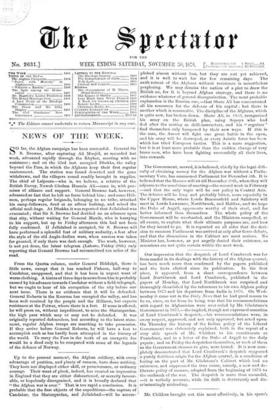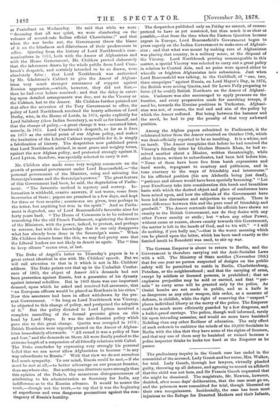Mr. Childers brought out this most effectively, in his speech
at Pontefract on Wednesday. lie said that while we were " dreaming that all was quiet, we were slumbering on the volcano of second-rate Indian official Chauvinism ;" and tha when the war broke out, the Government threw the blame of it on the blindness and dilatoriness of their predecessors in office. Quoting from the history of Lord Northbrook's com- munications in 1873, both with the Ameer of Afghanistan and with the Home Government, Mr. Childers proved elaborately that the inferences drawn by the whole public from Lord Cran- brook's despatch, and certainly intended to be so drawn, were absolutely false ; that Lord Northbrook was authorised by Mr. Gladstone's Cabinet to give the Ameer of Afghan- istan very much stronger assurances of support against Russian aggression,—which, however, they did not fear,— than he had ever before received ; and that the delay in enter- ing upon detailed arrangements was due, not to the Viceroy or the Cabinet, but to the Ameer. Mr. Childers further pointed out that after the accession of the Tory Government to office, the policy of Lord Northbrook received the hearty adhesion of Lord Derby, who, in the House of Lords, in 1874, spoke explicitly for Lord Salisbury (then Indian Secretary), as well as for himself, and that the change of policy,—a great change it was—occurred later, namely, in 1875. Lord Cranbrook's despatch, so far as it fixes on 1873 as the critical point of our Afghan policy, and makes the hesitation of the Liberal Cabinet responsible for it, is simply a falsification of history. The despatches now published prove that Lord Northbrook advised, in most grave and weighty terms, against the new Afghan policy, and protested strongly against it. Lord Lytton, therefore, was specially selected to carry it out.



































